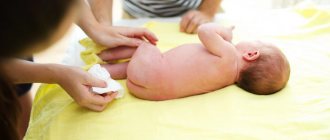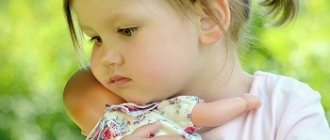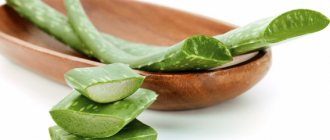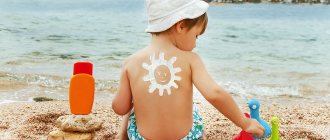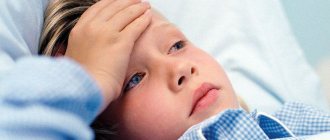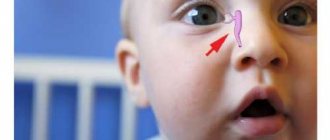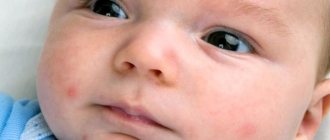Diarrhea in childhood can be caused by various factors: from a reaction to the eruption of baby teeth to an acute intestinal infection. Regardless of the cause of the disease, diarrhea always disrupts the functioning of the gastrointestinal tract.
A specialist must determine the cause of diarrhea and prescribe treatment. Parents need to be able to distinguish dangerous conditions that threaten the child’s health and provide symptomatic first aid. Not everyone knows what to give a child for diarrhea so as not to harm it, so it is worth understanding the causes of the disease and methods of treatment.
Tablets for diarrhea and diarrhea: list of drugs
Diarrhea is a fairly common problem that almost everyone has encountered at least once in their life.
In most cases, diarrhea is explained by mild poisoning from expired food and is treated accordingly - with plenty of fluids, herbal remedies from traditional medicine and a number of medications that are available in every home medicine cabinet for such cases. The most popular anti-diarrhea medications in our country are activated carbon and Smecta. Both of these drugs are sorbents with a pronounced detoxification effect, which are distinguished by their effectiveness and quick effect after use.
But in modern medicine, diarrhea is a rather complex disease that can be caused by a number of prerequisites. Therefore, there are quite different medications for diarrhea. We will sort out all this diversity so that the assortment of pharmacies only helps you in choosing the right product, and does not lead you to a state of confusion.
Classification of drugs for diarrhea
Antidiarrhea medications are divided into five groups:
- probiotics – drugs that are used to relieve symptoms of dysbiosis, one of which is diarrhea;
- medications aimed at slowing down the wave-like contractions of the walls of the rectum - peristalsis;
- antibiotics that eliminate the cause of diarrhea - intestinal infections;
- enterosorbents – means for binding exogenous and endogenous substances in the gastrointestinal tract by increasing adsorption, absorption, complexation and ion exchange;
- herbal preparations, which in most cases have an astringent and tanning effect on the intestinal contents.
Probiotics against diarrhea
Probiotics are products that contain microorganisms that are natural to the human intestinal microflora. If the microflora is disturbed - dysbiosis, probiotics help restore the balance of microorganisms, which leads to normalization of stool. There are many probiotics recommended for diarrhea. Let's look at the main ones:
| A drug | Release form | Price | Description | Mode of application |
| Linex | Capsules weighing 1 gram. | from 400 rub. | The antidiarrheal effect of Linex is due to the normalization of intestinal microflora. | For children under two years of age, this medication is prescribed one capsule three times a day, and for children over two years of age and adult patients - one or two capsules three times a day. |
| Bifidumbacterin | Powder in foil sachets, five doses per sachet. | from 80 rub. | Normalizes the activity of the gastrointestinal tract, has a negative effect on a large number of pathogenic and opportunistic bacteria. | Newborns - one or two doses of the drug three times a day, children from six months to a year - three doses three times a day, Children over one year old and adults - five doses of Bifidumbacterin three times a day. Treatment period is up to two weeks. |
| Bificol | Ampoules or vials of three doses each. | from 200 rub. | Bifikol is an antimicrobial drug, the substances of which also normalize the intestinal microflora. | Bifikol is used as prescribed by a doctor in one to five doses twice a day. You need to take the drug twice a day. The course of treatment is from two weeks. |
| Hilak Forte | Drops in bottles of 30 or 100 milliliters. | from 200 rub. | One of the most popular antidiarrheal agents. An undoubted advantage is that it acts exclusively in the intestinal lumen. Accelerates the absorption of food and prevents the spread of pathogenic flora. | The drops are dissolved in water and the recommended dose is taken three times a day before or during meals. Children under two years old – 15-30 drops, children under 12 years old – 20-40 drops, adults – 40-60 drops. After you feel better, the dose of Hilak Forte is reduced by half. |
Drugs to slow down peristalsis
The intensity of the defecation process depends on the wave-like contractions of the walls of the rectum. The drugs in this group slow down peristalsis, thereby normalizing stool. The main medications in this area include:
| A drug | Release form | Price | Description | Mode of application |
| Imodium | Capsules | from 250 rub. | Loperamide, which is part of Imodium, has a selective blocking effect on opioid receptors. | The drug is prescribed exclusively by a doctor. In most cases, adults take two capsules and children take one, with the frequency of dosing depending on the immediate effect. The maximum daily dose of Imodium is three capsules for children and eight capsules for adults. |
| Loperamide | Tablets, tablets for dissolution in water, capsules, syrup, solution for internal use. | from 25 rub. | The drug reduces intestinal motility and normalizes the tone of the anal sphincter. | For children from two to five years old, Loperamide is prescribed in the form of syrup: one milligram per 10 kilograms of the child’s weight three times a day. For older children, the drug is prescribed, depending on preference, two milligrams of Loperamide, and for adults, four milligrams. |
| Enterobene | Film-coated tablets for diarrhea. | from 180 rub. | A drug for the symptomatic treatment of diarrhea. | Children from eight years of age are prescribed one tablet at a time with a maximum daily dose of four tablets. The intensity of administration depends on the degree of diarrhea. For adults, a single dose of Enterobene is two tablets with a maximum daily dose of eight tablets. |
Which medicine should I choose?
The child's body is very sensitive. Therefore, those medications that help adult family members can harm the baby’s health. Parents should not rush to extremes and, when the baby develops loose stools, immediately load him with antibiotics. This option will only be effective if the cause of the painful condition is a bacterial infection. If the disorder is caused by viruses, antibiotics are powerless.
Diarrhea is only one of the symptoms of the disease, so the medicine is selected in each specific case, taking into account this factor and the condition of the child.
All existing versions of antidiarrheal drugs have the following properties:
- astringent,
- antimicrobial,
- restoring normal intestinal microflora,
- normalizing electrolyte balance,
- immunomodulatory.
The range of anti-diarrhea products is extensive, they all differ in action, composition, effectiveness, duration of action and release form. It is recommended to give medicines in the form of syrups to children 2 years of age, because it is still difficult for them to take tablets. A child over seven years old can already be given tablets or capsules in the appropriate dosage for his age, if permitted by the instructions.
There are many medications for diarrhea, but self-medication is strictly prohibited
Antibiotics for diarrhea
Antibiotics for diarrhea are taken only if the cause of diarrhea is accurately determined. If this stool problem is caused by an intestinal bacterial infection, then only then is taking antibiotics a justifiable solution. Visually, the presence of an intraintestinal infection can be determined by characteristic impurities in the stool: mucus and bloody greenish inclusions. In such cases, the following antibiotic medications are prescribed:
| A drug | Release form | Price | Description | Mode of application |
| Levomycetin | Tablets, powder for the preparation of injections for intramuscular or intravenous administration. | from 76 rub. | An antimicrobial drug effective against a variety of microorganisms. Has a pronounced bacteriostatic effect. Most pathogenic microorganisms are not capable of developing resistance to the drug. | Levomycytin tablets are prescribed one tablet twice or thrice a day, depending on the patient’s age and the intensity of diarrhea. Levomycetin injections are administered intramuscularly or intravenously. For children from three to 16 years of age, a single dose of the medicine is calculated according to the formula 25 milligrams of powder per kilogram of body weight twice a day. A single dose for adults is 500-1000 milligrams at the same frequency of administration. |
| Metronidazole | Tablets, solution for infusion, powder for solution for intravenous injection, suspension. | from 40 rub. | Metronidazole is a derivative of 5-nitroimidazole. Has antiprotozoal and antimicrobial effects. | Metronidazole tablets are prescribed one tablet twice a day. The course of treatment is up to four days. |
| Amoxicillin | Tablets, powder for injection, suspension, capsules. | from 27 rub. | A bactericidal antibiotic related to semisynthetic penicillins. Effective against intestinal infections. | Patients weighing over 40 kilograms of Amoxicillin are prescribed 0.5 grams of the drug three times a day. For lower body weights, a single dose is 0.25 grams, and for children under five years of age – 0.125 grams. |
Enterosorbents for diarrhea
The use of enterosobrents is considered one of the most effective remedies against diarrhea, which is caused by poisoning. The action of this group of drugs is aimed at absorbing toxic substances that enter the gastrointestinal tract from the outside. The most popular enterosorbents are:
| A drug | Release form | Price | Description | Mode of application |
| Activated carbon | Tablets, powder. | from 10 rub. | A drug familiar to everyone is the most effective remedy for diarrhea. It copes well with diarrhea, detoxifies the body and effectively absorbs toxins. | Activated carbon tablets are taken at the rate of one tablet per 10 kilograms of body weight. In case of poisoning, the drug in powder is prescribed 20 grams per dose. The powder solution is also used for gastric lavage. |
| Smecta | Powder for preparing a suspension. | from 130 rub. | A natural preparation with a pronounced adsorbing effect. Has selective sorption properties. | The course of treatment with Smecta ranges from three to seven days. The daily dose is: - children under one year - one sachet; - from one to two years - two sachets of Smecta; - children over two years old - two or three sachets; — adults – one sachet of Smecta three times a day. |
| Polysorb | Powder for preparing a suspension. | from 260 rub. | Polysorb binds and removes toxins of exo- and endogenous origin, as well as a variety of allergens. | For children under seven years of age, the dose of the drug is 150 milligrams per kilogram of body weight. For adults, the daily dose of Polysorb is 12 grams. The duration of treatment is from three to seven days. If necessary, it can be continued for up to two weeks. |
Antidiarrheal drugs for newborns
Loose stools in infants are treated with medications in the form of drops, emulsions, and solutions. The safest group of products are enterosorbents and probiotics. They help the body cope with diarrhea on its own, remove toxins naturally, and improve intestinal function. The drugs have a mild effect and do not provoke serious adverse reactions.
Enterosgel
The medicine, which is produced in sachets and tubes, is allowed from 1 month. The drug has an active substance - polymethylsiloxane polyhydrate. The drug is used in the treatment of diarrhea associated with stomach diseases, reflux esophagitis. The drug helps with poisoning, intestinal infections, allergies, and soothes inflamed intestines. When used simultaneously, the drug reduces the effect of other drugs. Price - 250-300 rubles.
Bifidumbacterin forte
The release form of the drug for newborns is a powder that consists of live bacteria. The medicine is used to treat intestinal infections; there are no contraindications. The product must not be combined with antibiotics - its effectiveness is sharply reduced. The excuse for stopping the medication is hypersensitivity. Price ‒ 200 rub.
Powder for babies made in the USA is a powerful probiotic that includes active bifidobacteria and lactobacilli and does not contain lactose. The drug is approved from birth, eliminates diarrhea due to dysbacteriosis and intestinal infections. Sold at a price of 560 rubles.
Diarrhea medications for children
Diarrhea (diarrhea) develops due to a violation of the intestinal microflora. The process is facilitated by the consumption of rough food: it contains excessively high fiber content, or poisoning. The second disorder is caused by an intestinal infection or the entry of low-quality products into the gastrointestinal tract. Under the influence of unfavorable factors, the consistency of stool becomes excessively liquid. The urge to defecate becomes more frequent up to 1-3 times per hour, the process is accompanied by abdominal cramps. To normalize the condition, various medications for diarrhea are used for children . A certain drug is prescribed by a doctor.
What remedies eliminate diarrhea in children: a review of effective options
To get rid of diarrhea, medications are used that remove toxins from the body, stop the activity of pathogens, and improve motor skills. In 80% of clinical cases, hospitalization in the infectious diseases or gastroenterology department is indicated. The doctor prepares treatment taking into account the diagnostic answers: if diarrhea appears, the examination is carried out urgently. Therapy involves the use of medications, nutritional correction, and normalization of the water regime.
Lactobacterin
It comes in the form of powder, suppositories, tablets. Lactobacterin contains organic substances, and this explains the possibility of using the drug for the treatment of diarrhea in children. The probiotic normalizes digestion, which is disturbed due to the following factors:
- Food intolerance.
- Intestinal infection.
- Eating low quality food.
- Incorrect introduction of complementary foods.
For these conditions, Lactobacterin is used as part of complex therapy. Additionally, it restores intestinal microflora, disturbed due to uncontrolled use of antibiotics.
Imodium
The main active ingredient of the drug is loperamide, which reduces the tone of intestinal smooth muscles. Imodium is in the form of capsules intended for lingual use (resorption). Taking the medication slows down intestinal contractions, so during the urge to defecate there are no pronounced cramps in the abdomen.
Attention! Imodium should not be taken by children under 6 years of age.
For the treatment of diarrhea in a child over 6 years of age, the drug should be used with caution, under monitoring of the condition. From 12 years of age, diarrhea is eliminated with an adult dosage of Imodium.
Smecta
The drug, which normalizes digestion, is in powder form, distributed in small sachets. The antidiarrheal drug is characterized by normal tolerability. Smecta can be used as monotherapy or as part of a complex treatment of diarrhea. Preparation of a single dosage involves dissolving the contents of 1 sachet in 50 ml of water.
Like every drug, Smecta has a slightly medicinal aftertaste, so the child may refuse to take the medication. In this case, the antidiarrheal agent can be added to food or sweet drink - tea, compote.
The daily dosage of the drug from the first year of life is 2 sachets. A prerequisite is good tolerance of the drug. Starting from the 2nd year of life, the daily dosage of antidiarrheal powder increases to 4 sachets.
In terms of therapeutic properties, Neosmectin can replace Smecta: it has a more pleasant taste and is better tolerated in childhood.
Phosphalugel
The medicine has a complex effect on the body. It removes toxic compounds accumulated due to the activity of pathogenic microflora and envelops the intestinal tissue. Phosphalugel can eliminate diarrhea in children, starting from the first year of life. The safe dosage of the drug for newborns is 4 g, provided that the drug is used no more than 6 times a day. If the child is older than 6 months, to get rid of diarrhea, he can be given 8 g of the product after each meal.
Regidron
A medication that performs the following functions:
- Cleanses the intestines of toxins.
- Helps restore the function of the gastrointestinal tract.
- Improves overall well-being.
- Prevents the development of dehydration.
- Stops diarrhea.
Rehydron consists of sodium, dextrose, and potassium. In terms of pharmacological properties, it resembles the action of Atoxil or activated carbon. Regidron powder is intended for preparing a solution. Open 1 sachet of the drug, pour the contents into 1 tbsp. warm water, stir, avoiding the formation of sediment. Within 24 hours you need to take this portion of the solution: 250 ml of the product corresponds to the daily norm for children.
Enterosgel
It has a complex effect: cleanses the intestines of toxins, helps normalize digestion. It has the form of a paste intended for internal use. The active substance of Enterosgel is silicon. The daily dosage of the medicine for a newborn (up to 6 months) is 0.5 tsp, but this volume should be divided into 4-5 doses. If the child is under 5 years old, Enterosgel should be taken ½ tsp, 3 times a day. At the same time, the well-being of children should be monitored as a reaction to the use of the drug. Teenagers take 1 tbsp. l. medications, 3 times a day.
Description of the disease
Childhood diarrhea is a bowel disorder of various types. Another name is diarrhea. In accordance with age characteristics, there are several varieties of the disease in question:
- Children whose age threshold has not exceeded one goal and who are breastfed are able to defecate 5-6 times during the day. Normal stool has a yellowish color with a uniform consistency, reminiscent of a porridge-like structure, which is devoid of impurities.
- Infants under one year of age who are bottle-fed defecate 4 times during ancient times. Sometimes the color may change to brown shades, which is also normal.
- Babies aged from one to 2 years have stools a couple of times during the daily period. The consistency of stool in children entering their second year becomes more uniform and thick, with a predominance of brown color.
- Children aged 2 years and older have bowel movements once a day. The color of stool is close to brown with a dense consistency.
The main signs of diarrhea in children are:
- frequent loose stools;
- poor or completely absent appetite;
- nausea followed by a gag reflex;
- general weakness;
- increased sweat production.
Children's diarrhea can have a different nature, but often the cause of its occurrence is the ingestion of infectious pathogens into the child's body. Sometimes diarrhea can develop as a result of taking a course of antibacterial drugs. In this case, the baby can be given special medications that have a therapeutic effect on the fight against dysbiosis.
Diarrhea can occur in a chronic form when it lasts more than a month. It is also possible to develop functional diarrhea, which is caused by the absence of a violation of the child’s condition. This type of stool disorder can be detected by submitting stool for laboratory tests.
Often the causes of childhood diarrhea are pathogenic microorganisms:
- Bacterial infection. In this case, diarrhea is caused by salmonella or various E. coli.
- Viral infection. The most common cause of diarrhea is rotavirus, which is especially dangerous for babies under one year of age, since the infection causes rapid dehydration.
Also, the cause of infection with pathogenic microorganisms can be a lack of personal hygiene, manifested in unwashed hands and consumption of dirty food. If you have a weak immune system, you can become infected with an already infected patient through close contact.
Traditional medicine to help get rid of diarrhea
If the use of traditional medicine recipes does not contradict the child’s health condition, it is permissible to use decoctions made from medicinal herbs.
Oak bark contains a high concentration of substances that strengthen the intestinal walls, preventing the frequent urge to defecate. To ensure a therapeutic effect, it is recommended to use a low concentration decoction: it has a light brown tint.
An equally useful recipe: pour boiling water over dry pear leaves and let it brew for at least 1 hour. Then filter the infusion and give 1 tbsp. l. up to 6 rubles/day.
The use of potato starch allows you to strengthen the intestines and prevent the appearance of liquid feces. Prepare the solution as follows: 1 tsp. Dissolve the powder in 100 ml of water at room temperature and give it to the child to drink. An alternative option is jelly.
Strongly brewed tea also helps get rid of diarrhea. But to prevent the development of insomnia, you need to take the drink in the morning or afternoon.
A decoction prepared from dry pomegranate peels (at the rate of 10 g of peels per 250 ml of boiling water) has antidiarrheal properties. Infuse the product for 50 minutes, filter, and let the child drink a third of the decoction. The rest of the amount is given after 4 hours.
If a child has diarrhea, only a specialist can prescribe medications. Before consulting a doctor, taking any medications is contraindicated.
Preventive actions
To eliminate any possibility of developing intestinal disorders in a child, it is enough to follow simple rules:
- Treat infectious processes in a timely manner.
- From an early age, teach your child to observe basic hygiene skills (wash hands before eating, going to the toilet, after a walk).
- Monitor the diet and do not allow foods of dubious quality to end up on your child’s plate.
- Adhere to cooking technology. Subject meat, fish, gifts from gardens and vegetable gardens to thorough heat treatment.
Rules for treating children's diarrhea with pharmaceutical drugs
- Medicine for diarrhea for young children must be chosen strictly according to indications.
- The frequency and dosage of drugs should be age-appropriate. An incorrectly selected number of tablets can lead to drug allergies and drug intoxication. Before using any drug, first read the instructions.
- Treatment is carried out only after examination by a doctor. You should not rely on the advice of pharmacy workers; it is better to try to find out the real cause of the unpleasant symptom with the help of specialists.
- When diarrhea is combined with abdominal pain, nausea, profuse vomiting, and high body temperature, acute abdomen must be excluded. Don't waste time, go to the hospital right away.
- For one-year-old babies and newborns, medications should be used in a convenient form (drops, powders, suppositories) so that the child can take the medication.
- It is better to postpone the use of untested, traditional methods of treatment. Herbal infusions can cause allergies in a weak child's body. If a rash, scratching, or swelling appears, stop giving your child the purchased drug and consult your pediatrician.
- If the prescribed medications do not have an effect within three days, the treatment must be urgently changed and the true cause of the disease must be found out.
Signs
The first thing you should pay attention to when a baby has diarrhea is the thickness and color of the stool. If it has acquired a greenish, bright yellow tint, this is a reason to visit a pediatrician. If the baby has bowel movements frequently (more than 8 times in 24 hours), but in small quantities. Do not delay visiting the hospital; delay is fraught with complications.
A dangerous sign that requires immediate attention without delay is the presence of bloody spots in the stool, mucus, and loose, almost transparent stool.
In addition to changes in the nature of feces, the baby may have a fever, abdominal pain, and the child will be capricious and cry. Symptoms may develop due to:
- in the first month, newborns may develop dysbiosis due to disturbances in the intestinal microflora;
- allergic reaction to lactose or other food;
- diarrhea in infants as a reaction of the body to teething, expressed by changes in stool;
- development of diarrhea after incorrect first feeding, when switching to artificial feeding;
- entry into the intestinal flora of bacteria and infections that cause bloating, rashes, and rapid weight loss;
- problematic bowel movements may occur after surgery;
- congenital pathologies of metabolic processes.
Forms of release of drugs against diarrhea
There are a huge number of causes of indigestion. The popular sorbent that saves you from all problems, activated carbon, does not always cope with the pathological situation in children. Several pharmacological groups of drugs solve the issue of diarrhea syndrome, acting directly on the cause of the disease.
Most of them are available in tablet form (Imodium, Loperamide, Enterobene). Anti-diarrhea tablets are a convenient remedy for use in everyday life for various diseases. But it’s difficult for children to drink them. In most cases, older people are prescribed tableted antidiarrheal drugs, and children are prescribed drops (Hilak Forte), suppositories (Viferon, Laferobion), syrups (Nifuroxazide), suspensions (Enterofuril). The medicine in powder form is well suited for treating children of different age categories.
Fighting dehydration
With diarrhea, a child's body is deprived of a large amount of fluid. It is important to restore water balance to avoid the development of dehydration. To do this, you can use special solutions sold in pharmacies, the action of which is aimed at replacing lost fluid.
The preparation of such products comes down to diluting the powder in a certain volume of water. After preparing such solutions, it is enough to give a few teaspoons every 10 minutes.
Stomach upset is common in children. The fact is that the functioning of the systems in the body has not yet stabilized. Some digestive enzymes may also be deficient. Caring parents should know how to treat diarrhea (diarrhea) in a 2-year-old child so that the pathology does not worsen and dangerous dehydration does not occur.
Review of approved medicines
We offer a list of popular, effective, safe children's drugs to combat the pathological process.
| Drugs | pharmachologic effect | Dosage, frequency of administration |
| Nifuroxazide | Banana-flavored anti-diarrhea suspension for children. has an antiseptic effect. The pleasant taste will delight children. | Take twice daily. |
| Motilium | Refers to peristalsis stimulants. The active substance is domperidone, which is a dopamine antagonist. The drug normalizes the functioning of the stomach and intestines, helps get rid of vomiting and nausea. | Available in tablets, approved for use from 12 years of age. Prescribed 1 tablet 3 times a day in the presence of pathological intestinal symptoms (vomiting, nausea, diarrhea). |
| Espumisan | In the presence of diarrhea, patients often complain of bloating. Espumisan destroys the formed gas bubbles and helps patients return to normal life. | Take 2 capsules 3-4 times a day. Children are allowed to be treated with the drug only from 6 years of age. |
| Hilak forte | The physiological intestinal flora is disrupted due to insufficient supply of nutrients to the small organism or as a result of prolonged, uncontrolled use of antibiotics. Beneficial bacteria do not perform their functions, peristalsis is disrupted and the baby suffers from diarrhea. Hilak Forte will help you cope with the problem quickly and effectively. It normalizes the quantitative composition of intestinal microflora, increases local immunity, suppresses the reproduction and growth of pathogenic agents. | Take 20 - 40 drops 3 times a day. The drug is approved from the age of two. |
| Potassium permangantsovka | The cheap medicine has an antiseptic, anti-inflammatory effect on the irritated stomach and intestines. Potassium permanganate destroys microorganisms, which is a positive point for the treatment of poisoning. | It is better not to take it for children under 1 year of age. After 1 year, enemas are given with a weak solution of potassium permanganate. |
| Creon | An enzymatic preparation consisting of pancreatin. Treats acute and chronic inflammation of the pancreas. If diarrhea occurs due to this condition, then the drug will act quickly and efficiently. | The frequency and dose of use is considered in each case individually, it all depends on the cause of the pathology and the patient’s condition. |
| Lactofiltrum | Sorbent with detoxifying probiotic properties. | Filtrum is taken from 3 years of age, half a tablet. |
| Enterodesis | If diarrhea occurs due to the action of toxic substances. | Drink 50 ml of solution 2 times a day. Allowed from 1 year |
| Normobakt | Contains beneficial bacteria that replenish the normal intestinal flora. | Approved for use from 6 months, 1 sachet. |
| Linex | Probiotic to restore intestinal microflora. | Prescribed from birth, one capsule per day. |
| Hydrovit | The drug restores the balance of electrolytes and fluids that are lost during diarrhea. Available in powder form. | Approved for use from birth, several sachets per day. Before use, the powder is dissolved in a glass of water and given to the child for 24 hours. |
| Trimedat | A medication that regulates intestinal motility. | Prescribed from 3 years of age at 25 mg three times a day. |
| Viferon | The drug is interferon, which is responsible for increasing the body's defenses. Used to combat diseases of viral etiology. If rotavirus infection is suspected, ARVI is actively used in pediatric practice. | It is used in children, 1 candle is placed 1 time per day. |
| Kipferon | An effective remedy for inflammation, against chlamydia, viruses. Available in the form of suppositories. | Doctors prescribe 1 suppository once a day for 5 to 14 days for bacterial or viral etiology of the disease. |
| Enterofuril (Nifuroxazide) | The product helps with acute infections and has antiseptic and antimicrobial effects. | Diarrhea syrup for children is taken 5 ml 3 times a day at the first symptoms of the disease. |
| Furazolidone | It has a wide spectrum of action, covering salmonella, shigella, and staphylococci. | Take 2 tablets 4 times a day. |
| Regidron | The powder replenishes electrolyte balance. | You need to dilute a packet of powder in 1 liter of water and take it throughout the day. |
Other medicines
Pharmaceuticals with other active substances are also used against severe diarrhea. For children you can use:
- "Loperamide" and its analogues. Slows down intestinal peristalsis and reduces the urge to go big. The medicine is fast-acting, but is not recommended for use in children under 7 years of age.
- "Furasilidon" and its analogue "Enterofuril" are used for babies over 12 months of age for food poisoning and dysentery.
- "Fthalazol". Eliminates germs that cause diarrhea. Suitable for children from 2 years old.
A suitable remedy for vomiting and diarrhea is Enterol, a medicine created on the basis of beneficial microorganisms. It also has antimicrobial effects.
We should not forget that with diarrhea, the baby’s body loses a lot of fluid and minerals. To restore the body from dehydration, you will need pharmaceutical anti-dehydration medications.
They are usually sold in sachets, each of which is designed to dissolve in a glass of water. This could be “Regidron”, “Hydrovit Forte”, “Gastrolit”. You can create a restorative drink yourself: per liter of water you will need two large spoons of sugar and a small spoon of salt. You can add a pinch of baking soda.
Parents need to remember that many antidiarrheal pharmaceuticals contain sweeteners, dyes, lactose and can cause allergies. If the baby’s reaction to the medicine is inadequate, stop using it and consult a doctor to select a safe analogue.
Diarrhea in infants and newborns is a big risk for the health of a tiny body. Timely recognition of signs and correctly selected treatment contributes to a rapid recovery without consequences. You should know what medications should be given to your baby for diarrhea.
Contraindications to drug treatment
Anti-diarrhea medications should be taken with caution. There are several contraindications to the use of drugs:
- If you have intestinal obstruction, which is accompanied by abdominal cramps, nausea, vomiting, you should not take medications.
- Enzyme deficiency (fructose and galactose are not digested).
- Individual intolerance to individual components of the drug.
- Appendicitis in young children is accompanied by profuse diarrhea. If you take antidiarrheals, the manifestation of clinical symptoms decreases and you can easily miss the “acute abdomen”, which quickly turns into peritonitis.
- Pseudomembranous colitis resulting from long-term use of broad-spectrum antibiotics.
Anti-diarrhea medications for young children need to be carefully selected; their body is still weak, and it is necessary to protect it from possible complications.
Why is it important to see a doctor?
If alarming signs are detected, it is recommended to go to the hospital, where comprehensive treatment will be prescribed. Otherwise, the baby may quickly become dehydrated due to fluid loss. A dangerous condition in an infant can be identified by dry lips, sunken eyes, dark brown urine that decreases in quantity as the disease progresses, and convulsions. The presence of vomiting is considered a dangerous condition; a lying position can contribute to choking on the escaping masses.
If a baby has diarrhea, it is better to call an ambulance and go to the hospital, this is the only way to save the baby and provide qualified assistance. Diarrhea is a dangerous condition for a small organism that requires immediate treatment.
